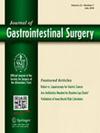胃癌胃切除术后第一年身体成分的变化和预测因素
IF 2.4
3区 医学
Q3 GASTROENTEROLOGY & HEPATOLOGY
引用次数: 0
摘要
目的:胃癌患者行胃切除术后,由于热量摄入和营养吸收减少,体重明显下降。体重通常需要大约1年才能稳定下来。本研究旨在探讨术后第一年与身体组成相关的变化和预测因素。方法:230例I-III期胃癌患者行根治性胃切除术。采用生物电阻抗分析法测量身体成分,并分析1年内的变化。采用多元回归分析确定身体成分变化的预测因素。结果:体成分的改变和显著的体重和体脂量的减少主要发生在术后的前6个月内。骨骼肌质量最初下降,但在6个月后有所改善,没有与辅助化疗相关的显著变化。全胃切除术和辅助化疗后患者术后6个月和12个月水肿增加。胃切除术类型和体重指数显著影响术后体重变化。胃切除术类型也与骨骼肌量和骨矿物质含量的变化有关。辅助化疗对6个月和12个月的全身相角有显著影响。结论:这些发现强调了术后最初的显著降低和随后的调整,并阐明了手术技术、辅助治疗、患者特征和中期身体成分变化之间复杂的相互作用。本文章由计算机程序翻译,如有差异,请以英文原文为准。
Change and predictors of body composition after gastrectomy for gastric cancer during first postoperative year
Purpose
After gastrectomy for gastric cancer, patients often lose significant body weight because of decreased caloric intake and nutrient absorption. Body weight typically requires approximately 1 year to stabilize. This study aimed to examine the changes and predictors of body composition during the first postoperative year.
Methods
A total of 230 patients underwent radical gastrectomy for stage I to III gastric cancers. Body composition was measured using bioelectrical impedance analysis, and changes were analyzed over 1 year. Multiple regression analysis was used to identify predictors of body composition changes.
Results
Body composition changes and significant body weight and body fat mass reductions occurred primarily within the first 6 months postoperatively. Skeletal muscle mass initially decreased but improved after 6 months without significant changes related to adjuvant chemotherapy. Increased edema was observed at 6 and 12 months postoperatively in patients after total gastrectomy and adjuvant chemotherapy. Gastrectomy type and body mass index significantly affected postoperative body weight changes. In addition, gastrectomy type was associated with changes in skeletal muscle mass and bone mineral content. Adjuvant chemotherapy significantly affected the whole-body phase angle at 6 and 12 months.
Conclusion
Our findings emphasized the initial significant reductions postoperatively and subsequent adjustments over time and elucidated the complex interplay between surgical techniques, adjuvant treatment, and patient characteristics and midterm changes in body composition.
求助全文
通过发布文献求助,成功后即可免费获取论文全文。
去求助
来源期刊
CiteScore
5.50
自引率
3.10%
发文量
319
审稿时长
2 months
期刊介绍:
The Journal of Gastrointestinal Surgery is a scholarly, peer-reviewed journal that updates the surgeon on the latest developments in gastrointestinal surgery. The journal includes original articles on surgery of the digestive tract; gastrointestinal images; "How I Do It" articles, subject reviews, book reports, editorial columns, the SSAT Presidential Address, articles by a guest orator, symposia, letters, results of conferences and more. This is the official publication of the Society for Surgery of the Alimentary Tract. The journal functions as an outstanding forum for continuing education in surgery and diseases of the gastrointestinal tract.

 求助内容:
求助内容: 应助结果提醒方式:
应助结果提醒方式:


